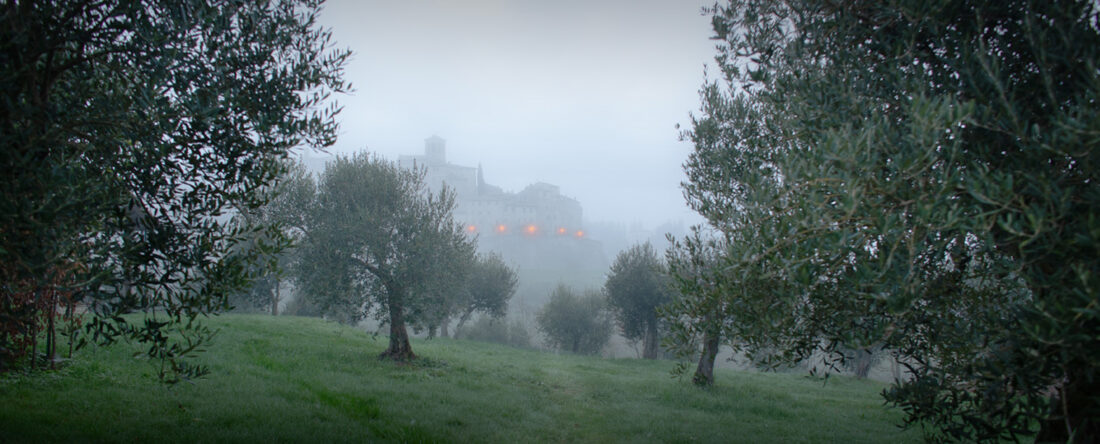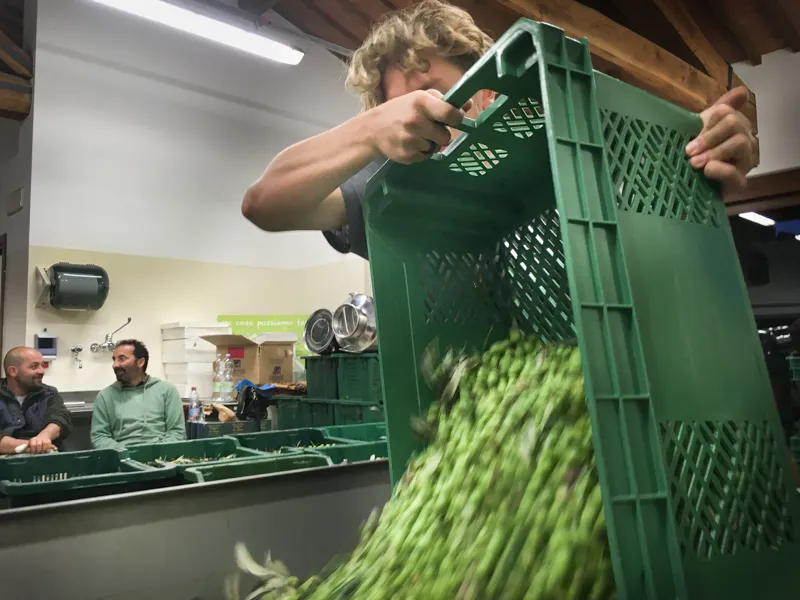
The Truth of Olives
Pliny the Elder had olive trees in this valley. Our trees’ long-ago ancestors were tended, harvested, and their oil savored on this land. So, we do the same while we are the custodians. Our brief tenure in this place is literally in our faces when we pick and look up at a village that has been here for 1,000 years.
Olive picking is all-consuming: spreading nets under the trees, raking the olives off the branches by hand and with small plastic rakes, pouring the olives caught by the nets into plastic crates, and moving the crates to safe storage until our scheduled time on the press. The speed and efficiency of every moment matters. We picked about 85% of the trees on the same day we took them to the mill, a record for us—any delay getting to the press affects the flavor and longevity of the oil.
This year, our hundred or so trees produced an abundance of olives. They are only produced on second-year growth and no matter how hard we try to even things out with pruning, the trees seem to have their own schedule of big yields every other year. Even with that baseline, everything matters. If heavy rain, wind, or hail hit when the tree has just produced blooms and is being pollinated, the crop can be destroyed. Olive flies can be a problem, ruining the mature fruit, unless there’s been enough heat in the summer, or a deep enough freeze in the winter, to kill the larvae.
The culmination is going to the olive oil press, or frantoio. The crates of olives are unloaded and weighed with great import, carefully watched by the others in line for the press. It’s a “I have more olives than you” moment—one of the few times when a competitive spirit arises in the valley, apart from sports. We do respectably well with the olives we have picked so far, with the olives weighing in at over 500 kilos (over half a ton), in 25 crates.
I remember one year when we had a similar yield, and we felt proud. We were put in our place by three scruffy 40-something guys who unloaded about 75 crates. “Smug devils,” I thought. We eyed them. They eyed us. No smiles. English is not spoken at the mill and the owner decided that our lack of fluency did not hinder communication in the slightest when it came to the important topics of life. He pulled us over to look at the olives unloaded by the three guys. “Idioti!,” he told them, encouraging us to chime in with our opinion. They’d used mechanized rakes, getting a great yield, but bruising the olives in the process, and mixing in a lot more twigs and leaves than is desired. The guys didn’t blink in the face of this criticism and complimented our smaller yield on the lack of leaves, twigs, and bruises. We were all laughing and chatting away now.

When it is our turn, the olives are poured into the hopper, one crate at a time. It is the last chance to pull out any leaves and twigs before the olives go up a conveyor belt to olive heaven to be washed and then crushed. It’s loud and the process takes at least an hour or two. There’s plenty of time to play with the dogs who are underfoot and peek through a trapdoor into the mid-press vats of olive paste, and be hit by a wave of the most delicious olive scent.
Finally the oil comes streaming out. Dark green and very peppery.
Once again the cycle is complete and the trees can rest. And they whisper that some seasons are abundant and other years a freeze or other setback hits. And some years a disaster strikes.
This all seems to matter more to me this year than most. In the scope of things—this village, this land, this process of turning olives from the trees into oil—time and events happen on a different scale while our ephemeral human selves pass through. But, hopefully, things like the olives remain. And I am listening carefully to what the trees are telling me this year and trying to accept their wisdom of patience and the big picture.






No Comments